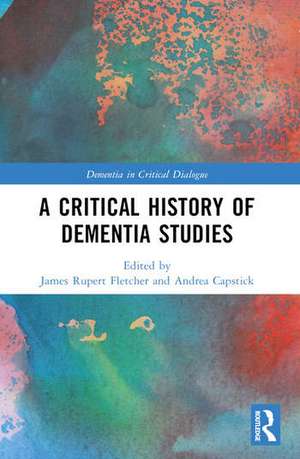A Critical History of Dementia Studies: Dementia in Critical Dialogue
Editat de Andrea Capstick, James Rupert Fletcheren Limba Engleză Paperback – 18 dec 2024
| Toate formatele și edițiile | Preț | Express |
|---|---|---|
| Paperback (1) | 310.16 lei 6-8 săpt. | |
| Taylor & Francis Ltd. – 18 dec 2024 | 310.16 lei 6-8 săpt. | |
| Hardback (1) | 1158.84 lei 6-8 săpt. | |
| Taylor & Francis – 26 sep 2023 | 1158.84 lei 6-8 săpt. |
Preț: 310.16 lei
Nou
Puncte Express: 465
Preț estimativ în valută:
59.35€ • 61.32$ • 49.37£
59.35€ • 61.32$ • 49.37£
Carte tipărită la comandă
Livrare economică 19 martie-02 aprilie
Preluare comenzi: 021 569.72.76
Specificații
ISBN-13: 9781032268828
ISBN-10: 1032268824
Pagini: 200
Dimensiuni: 234 x 154 x 15 mm
Greutate: 0.33 kg
Editura: Taylor & Francis Ltd.
Seria Dementia in Critical Dialogue
ISBN-10: 1032268824
Pagini: 200
Dimensiuni: 234 x 154 x 15 mm
Greutate: 0.33 kg
Editura: Taylor & Francis Ltd.
Seria Dementia in Critical Dialogue
Cuprins
Introduction; Part I: Paradigms; 1. Pathologisation, (bio)medicalisation & biopolitics; 2. The century without a war: Kitwood's concept of malignant social psychology and the need for historicisation in dementia studies; Part II: Discourses; 3. Language about people with dementia; 4. A Semiotic analysis of meanings of dementia around the world; 5. Literary dementia studies: from managing estrangement to imaginatively reconceptualizing forgetfulness; Part III: Intersectionalities; 6. Gender awareness and feminist approaches in dementia studies; 7. "On my good days, I can […] almost pass for a normal person": reading the film Still Alice using the conceptual lens of heteronormativity; 8. Race, ethnicity and culture: problematic application in dementia and old age; Part IV: Methodologies; 9. ‘Whose story is it and what is it for?’: Life story as critical discourse in dementia studies; 10. From symptoms to citizenship: A critical reading of the perceived value of arts and culture in a dementia context; Part V: Politics; 11. Human rights & dementia: a ‘socratic dialogue’; 12. Experts by experience: "I don’t want to be shaken, I want to be a shaker"; Conclusion: multi-disciplinary, multi-historied, multi-critical
Notă biografică
James Rupert Fletcher is a Wellcome fellow in the Department of Sociology at the University of Manchester, UK. His research covers several areas of the dementia economy, with an emphasis on using social theory and methods to understand dementia as a political entity. He has published on subjects including informal dementia care networks, mental capacity legislation and its influence on research governance, the anti-ageing technoscience market, anti-stigma and awareness raising campaigns regarding psychiatric disorder, the operationalisation of ethnicity and age in research, the biomarker discovery economy, the curation of dementia-friendly cultural events, dementia prevention public health strategies and environmental effects on cognition in urban settings. His lecturing spans medical sociology, the sociology of ageing, social research methods and ethical governance.
Andrea Capstick is an associate professor at the University of Bradford School of Dementia Studies. She originally worked alongside the late Professor Tom Kitwood to develop the first distance learning programme in dementia studies. Since then, she has at different times led both the BSc (Hons) and the MSc programmes in dementia studies at the University of Bradford. She holds a Doctorate in Education (EdD) for her work on the use of film and narrative biography in teaching dementia studies, and has published on a variety of subjects including participatory visual methods, arts-based approaches to teaching and learning, the representation of people with dementia in the popular media and dementia as a human rights issue. She has undertaken research funded by the NIHR (2012–15) on the impact of participatory filmmaking on social inclusion and well-being for people with dementia in long-term care, and more recently on the study ‘What works in dementia education and training?’ (2015–18) where she led the Patient and Public Involvement (PPI) work.
Andrea Capstick is an associate professor at the University of Bradford School of Dementia Studies. She originally worked alongside the late Professor Tom Kitwood to develop the first distance learning programme in dementia studies. Since then, she has at different times led both the BSc (Hons) and the MSc programmes in dementia studies at the University of Bradford. She holds a Doctorate in Education (EdD) for her work on the use of film and narrative biography in teaching dementia studies, and has published on a variety of subjects including participatory visual methods, arts-based approaches to teaching and learning, the representation of people with dementia in the popular media and dementia as a human rights issue. She has undertaken research funded by the NIHR (2012–15) on the impact of participatory filmmaking on social inclusion and well-being for people with dementia in long-term care, and more recently on the study ‘What works in dementia education and training?’ (2015–18) where she led the Patient and Public Involvement (PPI) work.


